By: Bethany Wight, Biologist
UF/IFAS Range Cattle Research and Education Center
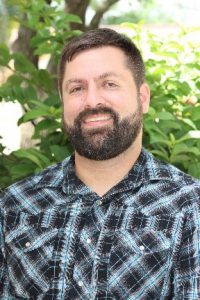
Wesley “Wes” Anderson was born in Bucks County, Pennsylvania and raised in Lancaster County where he graduated from Cocalico Senior High School in 2005. Lancaster is the heart of Pennsylvania Dutch Country so horse and buggies were a common sight. Wes played soccer throughout high school and was also the captain of his quiz bowl team. He started swimming at an early age which led to him working the front desk at his local pool and eventually becoming a lifeguard. At a young age, Wes spent a lot of time outdoors catching various critters, especially snakes and salamanders. Luckily his parents were accepting of his passion and he was able to keep several exotic pets, including tarantulas, snakes, and scorpions!
Wes received a Bachelor’s degree in biology in 2009 from the Davidson College, a small liber arts schools near Charlotte, N.C. During his undergraduate program, Wes helped in a herpetology lab and received formal training in field and laboratory techniques related to ecology and conservation biology. He also traveled to Costa Rica and spent a semester in Botswana taking conservation ecology courses.
After graduating Wes went to Texas Tech University and earned his Master’s degree in Wildlife, Fisheries, and Wildlands Science and Management in 2012. Under the advisement of Dr. Gad Perry, Wes examined aspects of the ecology and conservation of the Texas horned lizard in an understudied part of its range. His thesis was titled “Home range, habitat use, and conservation of the Texas horned lizard (Phrynosoma cornutum) in central Texas”. He was given a lot of independence and spent his time driving around central Texas and attaching radio transmitters to the horned lizards in order to use telemetry to evaluate their movements and habitat use.
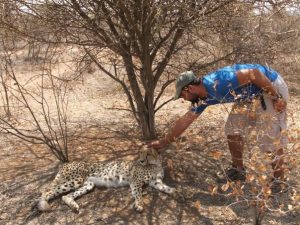
“In 2010, I spent over 100 nights camping while conducting my research. It was a great way to learn about the environment. The project was also funded by the Texas Army National Guard so part of it was on a base, which had its challenges as certain areas were off limits at times for live ammunition training.”
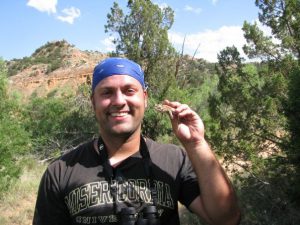
Seasonally prior to his Master’s program and full-time for several years, Wes worked as a biologist for Aqua-Terra Environmental Ltd., an environmental consulting firm in Pennsylvania. Here his work focused on threatened and endangered species and wetland monitoring and permitting, particularly on the federally threatened bog turtle. He worked closely with the USFWS and the PA Fish and Boat Commission and gained professional experience in the field and preparing reports for government agencies. After earning his M.S., Wes really wanted to take some time to travel before committing to a PhD program.
“I was drawn to Uruguay because I had some Spanish language experience and was interested in the cowboy culture and ranching heritage of the country. I also wanted to be by the coast, so it met all my criteria.”

While in Uruguay Wes taught English as a foreign language. He enjoyed getting to know the culture and remembers a huge parade shortly after he arrived called Desfile de Llamadas. He found the country very welcoming, having a strong Italian heritage, great food, and also very beef focused. Wes also enjoyed the coast and remembers seeing sea lions and penguins on his hikes. After returning to the U.S., Wes began researching PhD programs.
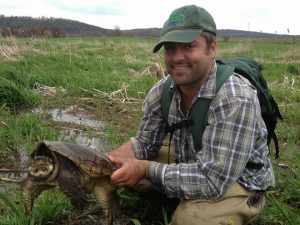
“I’ve had previous research interests in both non-game wildlife management (particularly reptiles and amphibians), invasive species, and wetlands. After my time in Texas and Uruguay, two places with strong ranching heritages, I also became more interested in conservation across agricultural landscapes. I applied to a funded position in Dr. Boughton’s lab and was happy to have the chance to conduct research combining all those interests.”
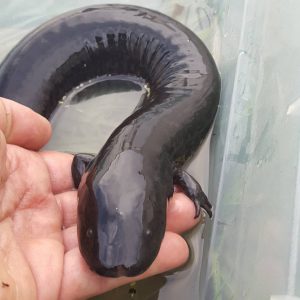
Wes began his PhD program at UF in 2014 investigating what impacts wild pigs have on aquatic fauna, particularly amphibians, and wetlands across a Florida cattle ranch. His research was conducted at Buck Island Ranch, a 10,000+ ac. commercial cattle operation in Highlands Co., FL owned by Archbold Biological Station. To address these questions, he utilized different data collection and analytical techniques including using drone-generated imagery, DNA analyses of wild pig feces, trapping of aquatic fauna, and dipnet surveys for tadpoles. Wes actually lived on the ranch for 2 ½ years and although it was very remote he met a lot of great people and really got to know the ranch habitat. His research has helped us further understand the impacts pigs are having on these important environmental resources and the animals that depend on them. This will help us potentially quantify and mitigate these impacts in the future.
When Wes is not conducting research he enjoys hiking, gardening, reading and attending concerts. Wes will graduate in December 2020.
“I’ve accepted a position as an assistant professor and wildlife extension specialist in the School of Forestry and Wildlife Sciences at Auburn University. The majority of my appointment is extension, but I’ll also be teaching. I’m looking forward to both immensely.”
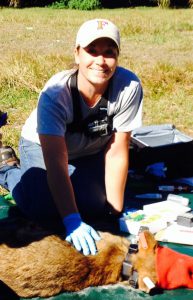
This was written by Bethany Wight, a biological scientist at the UF/IFAS Range Cattle REC in Ona, FL. If you have questions please contact her at bwight@ufl.edu.
 0
0
